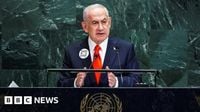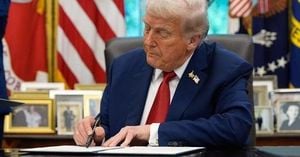Israeli Prime Minister Benjamin Netanyahu’s appearance at the United Nations General Assembly on September 26, 2025, was anything but routine. As he took the podium in New York City, dozens of officials and diplomats filed out in protest, leaving conspicuous gaps in the assembly hall. Yet, amid the walkout, Netanyahu was also met with cheers from supporters who had gathered for the occasion, illustrating the deep divisions his leadership and Israel’s policies continue to provoke on the world stage, according to Reuters and BBC reporting.
Netanyahu’s speech, delivered as the day’s first address at the annual gathering, was combative and unapologetic. He wasted no time in attacking the recent recognition of a Palestinian State by several Western nations, including the UK, France, Canada, and Australia—a move he branded a “mark of shame.” In his words, such recognition sent the message that “murdering Jews pays off.” His remarks were delivered to a hall that had rapidly emptied as delegates staged their walkout, a visual metaphor for the international tension surrounding Israel’s ongoing campaign in Gaza.
Outside the UN, the streets of New York were alive with protest. Demonstrators gathered in Times Square and outside Netanyahu’s hotel, making their opposition to Israel’s military actions in Gaza clear. Some, including members of the Jewish community, joined the “Autonomous Noise Demonstration for Gaza,” reflecting the complexity and diversity of opinion among Israelis and Jews worldwide.
Netanyahu’s address was not just a defense of Israeli policy; it was a forceful assertion of Israel’s military and strategic achievements over the past year. He declared that Israel had “crushed the bulk” of Hamas’s “terror machine” and was determined to “finish the job as fast as possible.” He also celebrated what he described as a string of victories, including Israeli operations against Hezbollah in Lebanon, the Houthis in Yemen, and Iran. He went so far as to thank former US President Donald Trump for American involvement in bombing Iran’s Fordo nuclear site in June 2025, a detail that underscores the close—if sometimes controversial—ties between the two nations.
Netanyahu used visual aids to drive home his points, displaying a map labeled “The Curse,” which he claimed showed the spread of Iranian proxy groups throughout the Middle East. Drawing a parallel between Hamas’s October 7, 2023 attack on Israel and the September 11 attacks in the United States, he insisted that Israel and the US were fighting the same enemies, referencing chants of “death to America” by groups linked to Iran. “We will not allow a Palestinian state to exist,” he declared, asserting that this hardline stance was shared by the majority of Israelis.
His speech was not without controversy back home. Israeli opposition leader Yair Lapid criticized Netanyahu’s performance, describing it as “overloaded with overused gimmicks” and accusing him of worsening Israel’s diplomatic standing. Yair Golan, leader of Israel’s Democrats party, echoed this sentiment, calling the loudspeaker stunt—where Netanyahu’s speech was broadcast live via trucks near the Gaza perimeter fence—“invalid, childish, and insane.” He described it as a “propaganda show” that did little to address the suffering of hostages or the sacrifices of Israeli fighters.
Netanyahu also addressed the fate of Israeli hostages in Gaza, using his speech to send a direct message: “This is Prime Minister Netanyahu speaking to you live from the United Nations. We have not forgotten you, not even for a second. The people of Israel are with you. We will not falter, and we will not rest until we bring all of you home.” According to the BBC, there are 48 hostages remaining in Gaza, 20 of whom are believed to be alive. But for many in Gaza, the live broadcast of Netanyahu’s speech felt like another layer of humiliation. Gaza resident Fadi told the BBC World Service, “What does he gain by broadcasting his speech forcibly to the besieged civilians inside the tents, except to further humiliate them?”
The timing of Netanyahu’s speech coincided with fresh violence in Gaza. The civil defence agency there, operating under Hamas authority, reported that Israeli forces killed more than 20 people across the territory on Friday, including 11 in Gaza City. Israel’s military stated that its air force had struck over 140 targets in Gaza in the previous day, targeting what it described as terrorists, tunnel shafts, and military infrastructure. AFP footage from the Al-Shati refugee camp near Gaza City showed heavy damage, with buildings’ facades blown off and residents, including children, searching through rubble for belongings. Power lines lay tangled on the ground, further evidence of the devastation.
Meanwhile, the humanitarian crisis in Gaza continues to deepen. In August, a UN-backed body confirmed that famine was taking place in Gaza City, even as Netanyahu rejected statements by multiple UN agencies that Israel is deliberately restricting the amount of aid entering the territory. The Israeli military campaign in Gaza, launched in response to the Hamas-led attack on southern Israel on October 7, 2023—which killed about 1,200 Israelis and resulted in 251 hostages—has since claimed the lives of at least 65,549 people, according to the Hamas-run health ministry. International journalists remain barred from entering Gaza independently, making it difficult to verify claims from either side, though some have been granted controlled access by the Israeli military.
Adding another layer to the day’s events, the United Nations released a long-awaited update to its database of companies with activities in Israeli settlements in Palestinian territories. The updated list now includes 158 firms from 11 countries, among them major names like Airbnb, Booking.com, Motorola Solutions, and TripAdvisor. UN rights chief Volker Turk did not mince words, condemning Israel’s settlement policy as a war crime and calling on companies to “take appropriate action to address the adverse human rights impacts” of their activities. “Where business enterprises identify that they have caused or contributed to adverse human rights impacts, they should provide for or cooperate in remediation through appropriate processes,” the report stressed. The update added 68 new companies and removed seven from the previous year’s list, prioritizing those with direct physical links to settlements, particularly in construction, real estate, mining, and quarries.
The UN rights office emphasized that the database is not exhaustive, having only had time to review 215 of the 596 companies about which it received submissions. Nevertheless, the report underscores the “due diligence responsibility of businesses working in contexts of conflict to ensure their activities do not contribute to human rights abuses,” as Turk stated. Most companies listed are based in Israel, but others hail from Canada, China, France, Germany, Luxembourg, the Netherlands, Portugal, Spain, Britain, and the United States.
Palestinian Authority leader Mahmoud Abbas, who spoke at the UN the day before Netanyahu, expressed his readiness to work with world leaders to implement a peace plan for Israel and the Palestinians. Meanwhile, former US President Donald Trump, speaking shortly after Netanyahu, claimed, “I think we have a deal on Gaza,” though he provided no further details. Speculation is rife that a ceasefire could be near, but as of now, the violence and suffering continue unabated.
The events at the United Nations this week highlight the profound divisions and intractable challenges that define the Israeli-Palestinian conflict. As leaders trade accusations and the death toll rises, the world watches—hoping for a breakthrough, but bracing for more of the same.




